|
Books Should Be Free Loyal Books Free Public Domain Audiobooks & eBook Downloads |
|
|
Books Should Be Free Loyal Books Free Public Domain Audiobooks & eBook Downloads |
|
Top Authors |
|---|
|
Book type:
Sort by:
|
By: Wilkie Collins (1824-1889) | |
|---|---|
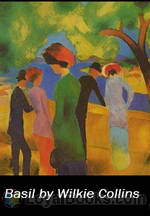 Basil
Basil
Basil, son of a father who values the family pedigree and who would not let him marry below his station, falls in love at first sight with a girl he sees on a bus. He stalks her and discovers she is Margaret Sherwin, only daughter of a linen draper. He stalks her and persuades her father to let him marry her secretly. He agrees on the condition, that, as his daughter is only seventeen, they live apart for the first year. At first the secret works, but then the mysterious Mannion, whose emotions cannot be read in his face, returns from abroad. On the last night of the year Basil follows Margaret and Mannion and discovers them in flagrante delicto. (Wikipedia) | |
 Poor Miss Finch
Poor Miss Finch
"Poor Miss Finch." That is what everyone calls the courageous protagonist of this book. In other words, "poor thing, she's blind, isn't it awful?" Ha! Lucilla Finch is the wisest of all the characters, in spite of, and perhaps because of, her blindness. This story is about her trials, tribulations and triumphs. She reminds me of myself. Not the falling recklessly in love and being pulled this way and that by foolish young men and mad old doctors. I mean that, like her, I'm blind and proud of it! (Introduction by Sandra G) | |
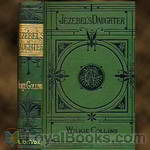 Jezebel's Daughter
Jezebel's Daughter
A brilliant chemist and a shrewd businessman — die on the same day. The widow of the chemist, Mrs. Fontaine, is left with the poisons he was researching , while Mrs. Wagner is left with her husband's mental health institution reforms and his plans for hiring women along with men in his firm's offices. Mrs. Wagner believes in treating madmen gently, and requests for the funny little man Jack Straw to be released from the madhouse. At the same time, her nephew David Glenney is sent to the Frankfurt office, where he works with Mr Engelmann and Mr Keller... | |
 The Guilty River
The Guilty River
After his father’s death Gerard Roylake returns from Germany to take up his inheritance at Trimley Deen. On one evening he meets his childhood friend, Cristel Toller. They fall in love, but there is a crux. A deaf man, called The Lodger is obsessed with Cristel. He invites Gerard to tea with evil intentions… and Gerard accepts the invitation.The book is written in the first person and tells the story from Gerard's point of view. | |
 Hide and Seek
Hide and Seek
The artist Valentine Blyth has a very generous heart. He lovingly cares for his invalid wife, rescues a deaf orphan girl from maltreatment in a traveling circus and adopts her, and mentors a young man who gets in trouble with his tyrannical father. The girl, who received the nickname ‚Madonna’, falls in love with the young man, Zack. Because one of Valentine’s biggest fears is that Madonna’s blood relations will one day trace her and take her away from his home, he keeps the little that he knows of her origins a strict secret... | |
 Queen of Hearts
Queen of Hearts
The elderly Brothers Owen, Morgan and Griffith live a quiet, retired life in the countryside, which is turned upside-down by Griffith's ward, the young Jessie Yelverton. Originally, her visit to them was to last only six weeks, but for a very certain reason, the gentlemen must find a way to prolong her visit and get Jessie to stay for ten more days. To make her stay, they promise to tell her an entertaining and exciting story each night... | |
 Man and Wife
Man and Wife
This 1870 novel by Wilkie Collins centers around a peculiarity of Scottish law of that time, according to which any man and woman 'who were legally entitled to marry and who asserted that they were married before witnesses, or in writing, were regarded in Scotland as being married in law.' This strange law causes the characters Arnold and Geoffrey both possibly accidentally marrying Anne, though one is engaged to another woman and the other is searching for a more wealthy wife to accomodate his lifestyle. In these circumstances, Anne needs to catch an actual husband in order to save her reputation... | |
 Evil Genius
Evil Genius
The Evil Genius, one of Wilkie Collins' last works, is subtitled "A Domestic Scene". It is the intriguing tale of family Linley, including the "evil genius", and their governess Sydney Westerfield. In colorful pictures, Collins presents the story of this family, which becomes entangled in the often hyprocritical Victorian perceptions of morality and decency. | |
 Miss or Mrs.?
Miss or Mrs.?
Natalie Graybrooke is in love with her cousin Launcelot Linzie, but engaged to Mr. Turlington, an older man who covets her fortune and whom she detests. Turlington is the executor of Natalie's father's estate. When Natalie secretly marries her cousin, Turlington arranges to have Natalie's father murdered, to gain control of his fortune. | |
 Antonina
Antonina
| |
 Rogue's Life
Rogue's Life
"[T]he story offers the faithful reflection of a very happy time in my past life. It was written at Paris, when I had Charles Dickens for a near neighbor and a daily companion, and when my leisure hours were joyously passed with many other friends, all associated with literature and art, of whom the admirable comedian, Regnier, is now the only survivor. The revising of these pages has been to me a melancholy task. I can only hope that they may cheer the sad moments of others. The Rogue may surely claim two merits, at least, in the eyes of the new generation—he is never serious for two moments together; and he "doesn't take long to read." W. C." | |
 Little Novels
Little Novels
| |
 A Fair Penitent
A Fair Penitent
| |
 Two Destinies
Two Destinies
Mary Dermody is destined to be together with George Germaine one day, or so at least her grandmother prophesizes. Destiny at first doesn't seem to adhere to this plan, and the pair is separated and lose sight of each other. But when George saves a young woman from drowning, a strong connection seems to develop between them, which seems to be almost supernatural.. | |
 Rambles Beyond Railways; or, Notes in Cornwall taken A-foot
Rambles Beyond Railways; or, Notes in Cornwall taken A-foot
| |
By: Stephen Crane (1871-1900) | |
|---|---|
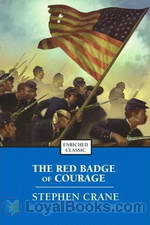 The Red Badge of Courage
The Red Badge of Courage
The Red Badge of Courage is a fiction that tells the story of a soldier named Henry Fleming during the American Civil War. The novel gained widespread praise from critics and was also a commercial success shortly after its release and made Stephen Crane an instant celebrity at the young age of 24. In the novel, Henry was one of the enlisted soldiers in the 304th New York Regiment. He flees from battle in one of the skirmishes they had against the Confederates and to hide his cowardice, he attempted to inflict a wound to himself which is referred to as the “red badge of courage... | |
 Maggie: A Girl of the Streets
Maggie: A Girl of the Streets
Stephen Crane’s first novel, Maggie: A Girl of the Streets has been called “the first dark flower of American Naturalism” for its distinctive elements of naturalistic fiction. The chief character, Maggie, descends into prostitution after being led astray by her lover. Rather than focusing on those that make up the very rich or middle class, the novel highlights the deplorable living conditions of the working class during the so-called Gilded Age in New York’s Bowery. | |
 Selected Short Stories
Selected Short Stories
At the time of his death at the age of 28, Stephen Crane had become an important figure in American literature. He was nearly forgotten, however, until two decades later when critics revived interest in his life and work. Stylistically, Crane's writing is characterized by vivid intensity, distinctive dialects, and irony. Common themes involve fear, spiritual crises and social isolation. Although recognized primarily for The Red Badge of Courage, which has become an American classic, Crane is also known for short stories such as "The Open Boat", "The Blue Hotel", "The Bride Comes to Yellow Sky", and The Monster... | |
 War is Kind (collection)
War is Kind (collection)
Published in 1899, just a year before his death, War Is Kind by Stephen Crane evokes again the dark imagery of war which made his fortune in The Red Badge Of Courage. Unlike that book, this collection leaves the battlefield itself behind to explore the damage war does to people’s hearts and minds. Reeking of dashed hopes, simultaneously sympathetic with the victims of war and cynical about the purposes of war, Crane implicitly criticizes the image of the romantic hero and asks if Love can survive... | |
 Maggie, a Girl of the Streets
Maggie, a Girl of the Streets
| |
 The Monster and Other Stories
The Monster and Other Stories
| |
 The Little Regiment
The Little Regiment
| |
 Active Service
Active Service
| |
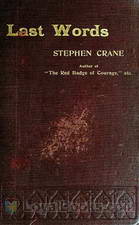 Last Words
Last Words
| |
 The Third Violet
The Third Violet
| |
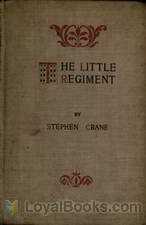 The Little Regiment And Other Episodes of the American Civil War
The Little Regiment And Other Episodes of the American Civil War
| |
By: Anicius Manlius Severinus Boethius (480-524/525) | |
|---|---|
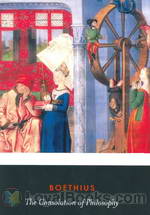 The Consolation of Philosophy
The Consolation of Philosophy
Consolation of Philosophy (Latin: Consolatio Philosophiae) is a philosophical work by Boethius written in about the year 524 AD. It has been described as the single most important and influential work in the West in medieval and early Renaissance Christianity, and is also the last great work that can be called Classical. Consolation of Philosophy was written during Boethius’ one year imprisonment while awaiting trial, and eventual horrific execution, for the crime of treason by Ostrogothic King Theodoric the Great... | |
 The Theological Tractates and The Consolation of Philosophy
The Theological Tractates and The Consolation of Philosophy
| |
By: Plato (427-347) | |
|---|---|
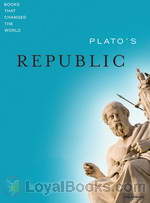 Plato's Republic
Plato's Republic
Plato's Republic is a Socratic dialogue which deals mainly with the definition of justice, the characteristics of a just city state and the just man. Although it was written more than two thousand years ago, many of the ideas and thoughts expounded here are still very much relevant to modern society. This is Plato's best known work and is also considered his most influential especially when it comes to the fields of philosophy and political theory. The Republic is divided into ten books and in each book Socrates discusses different topics from the immortality of the soul to the meaning of justice with his disciples like Glaucon, Thrasymachus, Adeimantus and others... | |
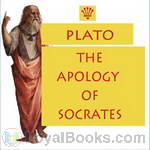 The Apology of Socrates
The Apology of Socrates
More than two thousand years ago, the great Greek philosopher Socrates was condemned to death for making seditious comments against the city state of Athens. His followers and disciples were legion. Ranging from Xenophon, the mercenary warrior and historian of the Peloponnesian War to the scholarly Plato, Socrates was described as the conscience-keeper of the nation, or the “gadfly” who would not let the massive machinery of the state rest in complacence. The Apology of Socrates by Plato was thought to have been written following Socrates trial and death in 399 BC... | |
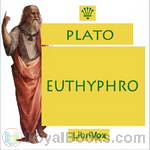 Euthyphro
Euthyphro
Awaiting his trial on charges of impiety and heresy, Socrates encounters Euthyphro, a self-proclaimed authority on matters of piety and the will of the gods. Socrates, desiring instruction in these matters, converses with Euthyphro, but as usual, the man who professes to know nothing fares better than the man who claims to be an expert. One of Plato’s well-known Socratic Dialogues, Euthyphro probes the nature of piety, and notably poses the so-called Euthyphro Dilemma: Do the gods love a thing because it is holy, or is a thing holy because it is loved by the gods? | |
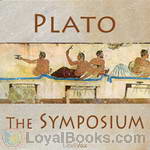 The Symposium
The Symposium
The Symposium (Ancient Greek: Συμπόσιον) is a philosophical book written by Plato sometime after 385 BCE. On one level the book deals with the genealogy, nature and purpose of love, on another level the book deals with the topic of knowledge, specifically how does one know what one knows. The topic of love is taken up in the form of a group of speeches, given by a group of men at a symposium or a wine drinking party at the house of the tragedian Agathon at Athens. Plato constructed the Symposium as a story within a story within a story... | |